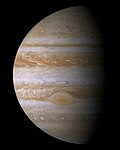Pioneer 11
 An artist's impression of a Pioneer spacecraft on its way to interstellar space. | |
| Mission type | Planetary and heliosphere exploration |
|---|---|
| Operator | NASA / ARC |
| COSPAR ID | 1973-019A |
| SATCAT no. | 6421 |
| Website | Pioneer Project website(archived) NASA Archive page |
| Mission duration | 22 years, 5 months, 25 days |
| Spacecraft properties | |
| Manufacturer | TRW |
| Launch mass | 259 kilograms (571 lb) |
| Power | 155 watts (at launch) |
| Start of mission | |
| Launch date | April 6, 1973, 02:11:00 UTC |
| Rocket | Atlas SLV-3D Centaur-D1A Star-37E |
| Launch site | Cape Canaveral LC-36B |
| End of mission | |
| Last contact | September 30, 1995 |
| Flyby of Jupiter | |
| Closest approach | December 3, 1974 |
| Distance | 43,000 kilometers (27,000 miles) |
| Flyby of Saturn | |
| Closest approach | September 1, 1979 |
| Distance | 21,000 kilometers (13,000 miles) |

| |
Pioneer 11 (also known as Pioneer G) was a NASA space probe to explore space and gather information. It was the second mission to visit Jupiter and the first mission to visit Saturn. The space probe was launched on April 5, 1973 and flew by Jupiter on December 2, 1974 and Saturn on September 1, 1979.
In 1983, Pioneer 11 was predicted to be surpassed by Voyager 1 in the distace to the Sun and later by Voyager 2 around March 1988.
The probe was last heard on November 24, 1995 when the last communication between Earth and the probe ended due to power limitation and vast diatance, when it was 44.1 AU (4.1 billion miles or 7.5 billion km) from Earth.[1][2]
By Nov. 5, 2017, Pioneer 11 was estimated to be about 97.590 AU (9.1 billion miles or 14.599 billion kilometers) from Earth.
Both Pioneer 10 and Pioneer 11 had plaques etched in gold. The plaques were designed by a team lead by Carl Sagan to communicate with extraterrestrial life should the spacecraft come into contact with it.
By 2027, Pioneer 11 is predicted to have exited the heliosphere and entered interstellar space.
Related pages
[change | change source]References
[change | change source]- ↑ "The Pioneer Missions". 3 March 2015. Archived from the original on 15 August 2011. Retrieved 16 June 2020.
- ↑ "Pioneer 11: In Depth". Retrieved December 10, 2017.
Other websites
[change | change source]- Pioneer Project Home Page Archived 2007-09-13 at the Wayback Machine
- Pioneer 11 Profile Archived 2007-08-02 at the Wayback Machine by NASA's Solar System Exploration
- Ted Stryk's Pioneer 11 at Saturn page Archived 2007-10-04 at the Wayback Machine
- NSSDC Pioneer 11 page Archived 2006-06-15 at the Wayback Machine
- Pioneer Odyssey, NASA SP-396, 1977 Archived 2006-08-13 at the Wayback Machine - This is an entire book about the Pioneer 10 and 11 project, with all pictures and diagrams, on-line! Scroll down to click on the "Table of Contents" link.


